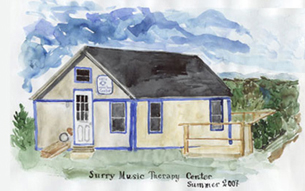What is Music Therapy?
What is Music Therapy?
Individuals with physical, emotional, and cognitive difficulties find that music therapy opens new channels of communication and contact. Music as therapy brings joy, beauty, a smile and laughter as well as a calming and nurturing effect to some clients, while providing an outlet for frustrations for others. It helps to activate and enhance the memory and quality of life for elderly clients.Music therapists work closely with and support the goals and objectives of psychologists, social workers, counselors, special education and speech, occupational and physical therapists. It is a creative, interactive, clinical, educational and rehabilitative treatment approach.
 Music Therapy is an effective form of psychotherapy. It offers freedom of exploration and a new sense of self discovery as clients give sound and energy to emotions and issues that may be painful, confused or blocked. Each client is unique in terms of their psychological issues and special needs. Music therapy can reach clients that are resistant or relatively unresponsive to other treatment approaches.
Music Therapy is an effective form of psychotherapy. It offers freedom of exploration and a new sense of self discovery as clients give sound and energy to emotions and issues that may be painful, confused or blocked. Each client is unique in terms of their psychological issues and special needs. Music therapy can reach clients that are resistant or relatively unresponsive to other treatment approaches.
Who Benefits from Music Therapy?
MUSIC THERAPY can reach children, adolescents and elders who are resistant or relatively unresponsive to other treatment approaches. Music therapy evokes responses in:
- Communication skills
- Improved concentration
- Enhanced memory
- Interactivity and relatedness
- Self discovery/ understanding
- Improved motor skills, coordination strength and balance
- Better listening skills
Music Therapy can be beneficial for children and adults of all ages, from ages 2 to 102. It is especially meaningful to those with:
- Autism, Downs Syndrome, Cerebral Palsy, Pervasive Developmental Delays (PDD), genetic and neurologic birth defects, visually and auditorially impaired and multiple impairments
- Developmental delays in the areas of education, speech, occupational and physical therapy
- Emotional / Behavioral issues: Attention Deficit Disorder (ADD), hyperactivity, aggressive and injurious behaviors
- Medically related concerns: Parkinson’s, stroke, respiratory, physiological, motoric, traumatic and neurological disorders and injuries
- Psychological, behavioral and social emotional issues; depression, anxiety, trauma, stress, bipolar and obsessive compulsive disorder (OCD) and interpersonal issues
- Geriatric concerns: Alzheimer’s, dementia, overall loss of functioning due to aging, stroke, depression, isolation; Music therapy improves self-confidence and quality of life



